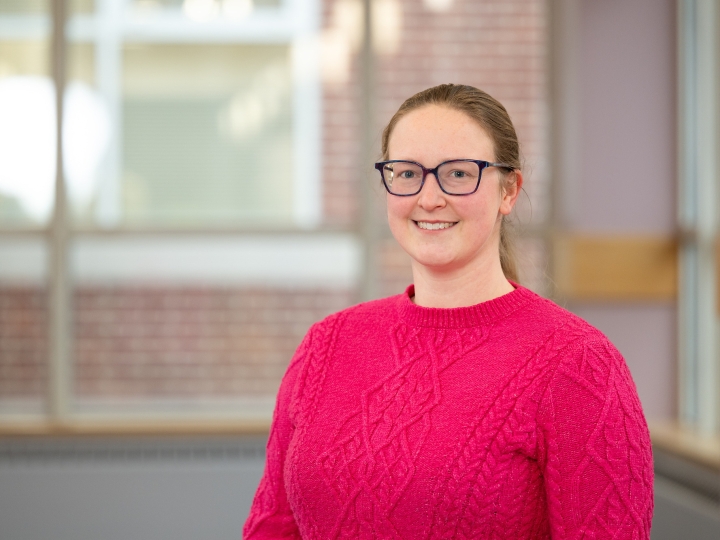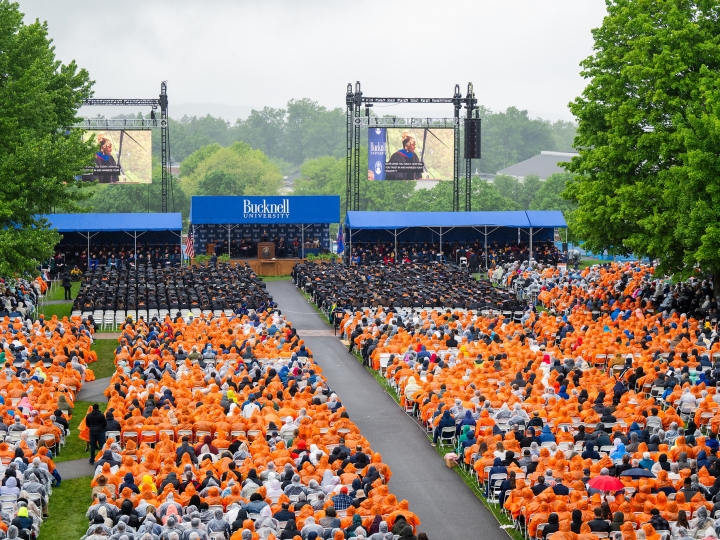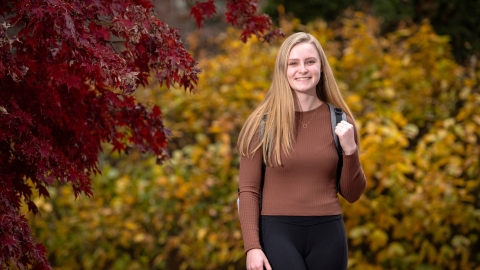
Bucknell Students Named as National Science Foundation Fellows and Goldwater Scholars
May 20, 2024
Goldwater Scholar Marion Duval '25 began conducting cross-disciplinary research in biology and chemistry during her first year at Bucknell. Photo by Emily Paine, Marketing & Communications
Six Bucknellians have been awarded two of the most prestigious fellowships and scholarships in higher education: National Science Foundation (NSF) Graduate Research Fellowships and Barry Goldwater Scholarships. These highly competitive awards support students who demonstrate a rigorous commitment to research and the pursuit of scientific discoveries and advancements that have the potential to make a significant impact on their fields of study and the future.
NSF Graduate Research Fellows
The oldest graduate fellowship in the country, the NSF program supports students who pursue research-based master's and doctoral programs in STEM disciplines.
Marianne Voigt '24
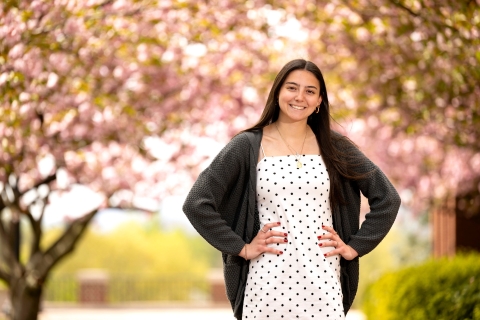
Marianne Voigt '24, a biomedical engineering major, is one of three current Bucknell students to receive a National Science Foundation Graduate Research Fellowship. Photo by Emily Paine, Marketing & Communications
When Voigt, a biomedical engineering major from Long Island, N.Y., arrived at Bucknell, she wasn't sure if she was interested in research. However, when Professor Benjamin Wheatley, mechanical engineering, visited her class to share his research, something sparked inside of her. "I just thought it was really cool, so I sent him an email. He answered it and, ever since then, I've been doing research with him in his lab since fall of my sophomore year."
In Wheatley's Mechanics and Modeling of Orthopedic Tissue Lab, she collected motion capture data as part of a study designed to develop a specialized shoe insert that can relieve pain for people with gait abnormalities.
Voigt's immersion into biomechanics also prompted her to revisit an interest that stemmed from her time as a high school athlete, in which she noticed a prevalence of ACL tearing in female teammates who were menstruating at the time of their injuries. "I went to a couple of conferences for research when I was here at Bucknell and there were researchers starting to make connections about the menstrual cycle influencing ACL tearing in female athletes," says Voigt. "So when I decided that I wanted to go to graduate school, I decided that I wanted to look more into that."
After graduation, Voigt will begin a doctoral program in biomedical engineering at Duke University where she hopes to study the relationship between sex-based hormones and ACL tearing.
Ally Clarke '24
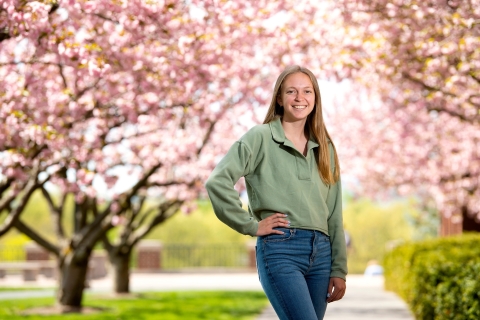
Biomedical engineering major Ally Clarke '24 is one of three current Bucknell students to earn a highly prestigious National Science Foundation Graduate Research Fellowship. Photo by Emily Paine, Marketing & Communications
Clarke, a biomedical engineering major from Malvern, Pa., started her research career during her sophomore year in Professor Benjamin Wheatley's Mechanics and Modeling of Orthopaedic Tissues Lab, where she learned how to measure the electrical signals within muscles as part of a study into footwear devices that can reduce pain. "Professor Wheatley is a really strong mentor and is really excited about research, which kind of instilled excitement about research in me."
This experience, coupled with a summer seminar designed to help applicants with the NSF application process, led by Professor Wendelin Wright, mechanical and chemical engineering, led Clarke to pursue a doctoral degree in mechanical engineering at the University of Washington. There, she'll join a lab that studies how the dynamics of the neuromuscular system affect mobility and how people interact with assistive devices. "I got into biomedical engineering because I was really interested in prosthetics. Through Bucknell's curriculum, I've seen the wide range of how biomedical engineering can be applied, so my interest shifted more from prosthetics to how users interact with assistive devices."
Georgia Corbett '24

In 2021, Georgia Corbett '24 secured funding through the National Science Foundation to conduct theoretical math research at the University of Michigan-Dearborn. Photo by Emily Paine, Marketing & Communications
Corbett '24, a mathematics major from Niantic, Conn., knew from the time she was in middle school that she wanted to be a mathematician. "I was good at math and I wanted to get my Ph.D. in mathematics," she says. "That pointed me here because Bucknell offers research opportunities starting your first year through Presidential Fellowships."
Since arriving on campus, Corbett has collaborated with a number of faculty, working on operations research, mathematical optimization and number theory. In the beginning of the fall of 2021, in collaboration with Professor Pamela Gorkin, mathematics, Corbett started what would eventually become her honors thesis. "Dr. Gorkin is fantastic. I've learned a lot about what it means to do good research," says Corbett. "She's also an excellent writer, so it's been great to learn how to write and edit well for my honors thesis."
Corbett's thesis is focused on mathematical analysis, and she hopes to use her research to make math more publicly accessible. After Bucknell, she'll pursue a doctorate in mathematics at Washington University in St. Louis under a Dean's Distinguished Graduate Fellowship.
Barry Goldwater Scholars
Goldwater Scholarships are awarded to college sophomores and juniors who plan on pursuing research careers in engineering, mathematics and the natural sciences. These Bucknellians are three of the 438 college students who were selected from a pool of over 5,000 nominations across 446 academic institutions in 2024.
Marion Duval '25

Goldwater Scholar Marion Duval '25 began conducting cross-disciplinary research in biology and chemistry during her first year at Bucknell. Photo by Emily Paine, Marketing & Communications
As a Presidential Fellow at Bucknell, Duval has been involved in research since her first year on campus. As a cell biology/biochemistry major from Middleton, Mass., that research has evolved into a cross-disciplinary project with two mentors: Professor Moria Chambers, biology, and Professor Sarah Smith, chemistry.
"I'm looking at antimicrobial peptides, which are small proteins that have the ability to kill or inhibit the growth of different microbes such as bacteria and fungi," says Duval. In light of the burgeoning antibiotic resistance crisis, researchers have turned their attention to the therapeutic potential of these peptides to serve as alternative or supplemental treatments to traditional antibiotics. Working with cecropins, a family of peptides found in a variety of insect species, Duval synthesizes peptide sequences in the lab and employs the use of CD spectroscopy to identify primary and secondary structures within those sequences. "If it has a secondary structure, that generally means it has better activity and is better able to attack bacterial cells, and is less likely to be degraded in the body."
After graduation, with the support of her Goldwater award, Duval hopes to continue her research by pursuing a doctorate in biochemistry.
Grace Ginder '25
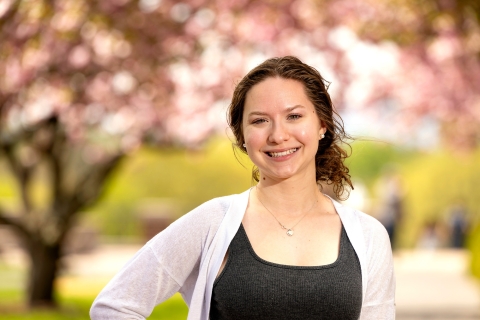
Grace Ginder '25, a double-major in biology and classics and ancient Mediterranean studies, is one of three current Bucknell students to be awarded a Goldwater Scholarship. Photo by Emily Paine, Marketing & Communications
In a biology lab led by Professor Moria Chambers, Ginder, a double-major in biology and classics and ancient Mediterranean studies from Lebanon County, Pa., works with fruit flies to study the qualities of the innate immune system, which functions as a host’s first line of defense against germs and pathogens. "Fruit flies are a great model organism to study when you're studying innate immunity," says Ginder. “Humans have an innate and an adaptive immune system, but fruit flies only have an innate immune system, and it's really similar to ours."
In her experiments, Ginder prepares bacteria and injects fruit flies so she can gather data about how their immune systems respond. Specifically, she is focused on examining how antimicrobial peptides, which are essential components of innate immune defenses, respond to fighting off bacterial infections.
As a Presidential Fellow, she has been involved with research since the time she arrived on campus, and her work with fruit flies has only solidified her passion for it. "I really fell in love with research as I started doing it. Being able to apply and get the Goldwater Scholarship feels like a reassurance in my ability and my determination to do research," she says, who will conduct research into skin microbiota at MIT this summer. "After Bucknell, I want to pursue a Ph.D. in immunology, and this was a great lab to be able to start that process."
Alejandro Vargas-Altamirano '25
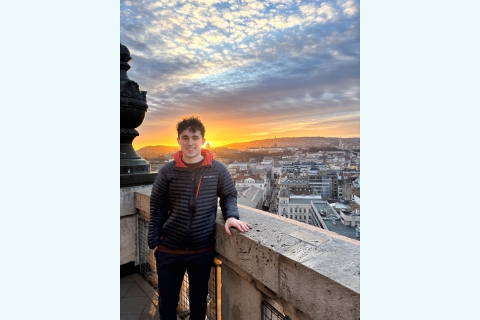
Alejandro Vargas-Altamirano ’25, a mathematics and computer science and engineering double-major, was awarded a Goldwater Scholarship for his research in number theory.
When Vargas-Altamirano '25, a mathematics and computer science and engineering double-major, found out about his Goldwater award, he was in Hungary's capital city completing a Budapest Semester in Mathematics, widely held to be one of the most prestigious study-abroad programs for undergraduate math students.
After his semester abroad, Vargas-Altamirano will return stateside to complete a summer internship with Travelers Insurance and resume a research project with Professor Nathan Ryan, mathematics, which examines the modular form and its connections to number theory. "My research is focused on complex functions, which means that their input and output is a complex number. They're important functions in number theory because they can encode information about different number theory objects," he says. More broadly, his interests lie within the fields of theoretical computer science and pure math, which encompasses the study of math concepts and complex theories independent of outside applications. In other words: math for math's sake.
"Approaching a problem feels almost like playing a game because there are a lot of different ways to go about it," says Vargas-Altamirano. "I find it really satisfying when you have a problem that, on its face, seems very abstract or hard to prove. Seeing that there's actually a clever, straightforward proof, and coming to that conclusion on your own, is really satisfying."
